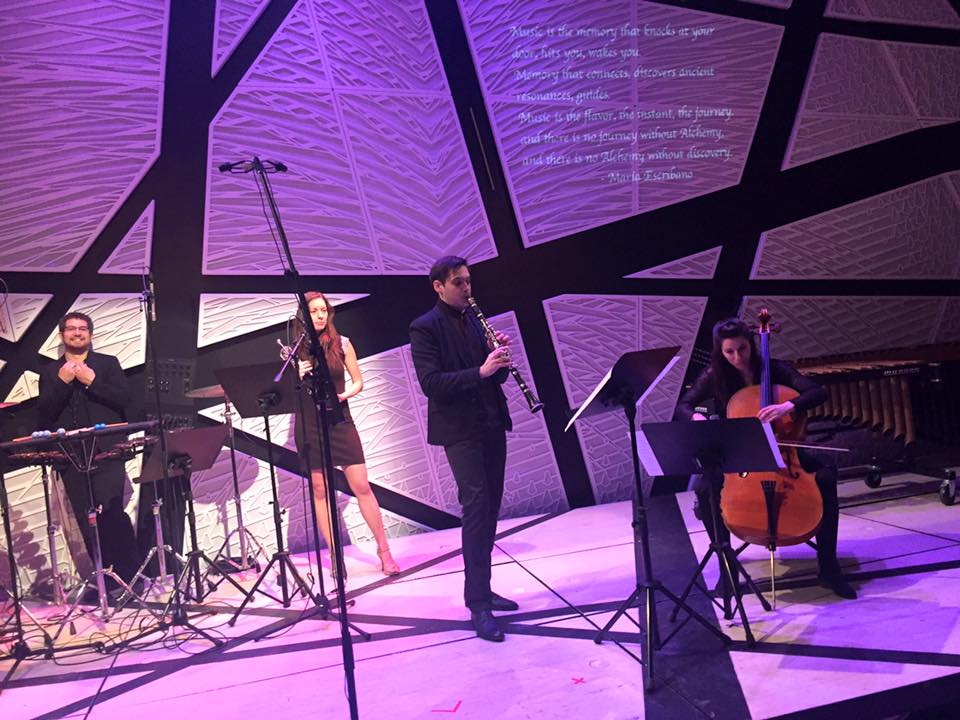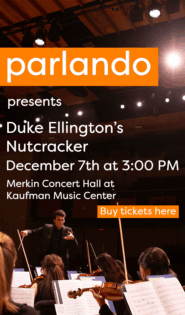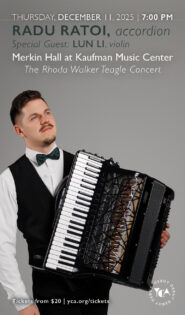“Reflection Now!” as Ensemble ACJW kicks up the sawdust
As more ensembles make their way across the East River to give concerts at National Sawdust, it’s interesting to see how the intimate venue reconfigures itself for each event. There is an optional stage that rises out of the floor, and chairs can be set up in a variety of ways. The sound is worthy, there’s a bar, and plenty of music. With SubCulture on cryogenic suspension, and the discomfort and bad acoustic of (le) poisson rouge, National Sawdust is now the de facto “downtown” place for modern music.
The latest guest was Ensemble ACJW Tuesday night, the training group run by jointly by the Juilliard School, Carnegie Hall, and the Weill Institute. The Ensemble is a place for talented young musicians to gain both performing and teaching experience. ACJW plays a broad range of music at sites all over New York City, and in Williamsburg with their program, “reflections,” they brought six new and recent works, and one “classic” avant-garde piece.
One of the group’s outstanding musicians is cellist Andrea Casarrubios, who opened the evening, with percussionist Garrett Arney. Casarrubios’s Speechless—heard in its world premiere—fit well into the theme of the concert, as “a space where both the audience and the performers can explore their own voices.” That generic sentiment was a strength and a weakness of Casarrubios’ piece and of the concert overall.
Speechless at times was an exploration of the timbres of the cello and bowed vibraphone, at others of rhythmic and melodic energy. The mood and form of the piece were amorphous, unable to settle on a clear purpose. But it was never less than pleasing, and the playing was elegant and dramatic, especially in the lovely melody that ends the work.
Accompanying Speechless, and continuing throughout the concert, were a series of quotes projected on the back wall. Every time one looked up, the poems and aphorisms from Maria Escribano, Montaigne, Schopenhauer, Howard Thurman, and Bill Watterson, were less helpful suggestions toward contemplation—intrusively prodding one to “Reflect, now!”
Jay Wadley’s Varying Density combined oscillators, that Wadley controlled from a laptop, with trumpet (Jean Laurenz), viola (Danny Kim), and bowed crotales (Arney). For the first several minutes, the instruments matched tonic and overtones with the oscillators, and the sound was beautiful with a simple, magical effect. But the second section introduced intervallic material in the instruments, and both the simplicity and magic disappeared.
There was a notable difference between the first two pieces, from young composers, and the remaining works from more experienced ones. The former seemed not to fully trust their own ideas, while the latter were clear and confident in their goals and means.
Casarrubios and clarinetist Stanislav Chernyshev played Svante Henryson’s funky, lively, Off Pist, with great agility and spirit. A punchy song that mixes urban sophistication with the flavor of the Hardanger fiddle, Off Pist sets up a continuous series of small surprises and big satisfactions.
A sextet played Missy Mazzoli’s enticing Still Life with Avalanche. The work was written for eighth blackbird, and, in contrast to that group, performance was fairly stiff. The ensemble did reveal interesting details in the music, like the crazy waltz that underpins it, as well as catching caught some of the barely concealed tragedy of the work, written in response to a sudden death in her family.
The evening’s classic was John Cage’s 4’33″. As a reflection on how sounds might be heard as music, it was an aesthetic fit, but National Sawdust turned out to be a bad venue for it. The performance space is so well insulated from outside noise that, in the hush, the only sound apparent was the ventilation system—the audience was far too respectful to disturb the peace. The “players,” a piano quartet Tuesday night, gave the silence their all.
Arney returned, with violist Dana Kelley, to play “R.S.”, one of Claude Baker’s Three Phantasy Pieces. “R.S.” is a riff on a riff, the opening fanfare of Schumann’s Märchenbilder No. 2. Rather than a Romance, Baker builds something closer to a march; a counterpunching duet between the viola and an array of brake drums, frame drums, octabongs, and bongos. Kelley and Arney played with an easy swagger.
Kelley, violinist Siwoo Kim, and cellist Caleb van der Swaagh finished the evening with Dobrinka Tabakova’s beautiful Insight. The piece is in a simple ABA form, with slow chorales sandwiching an energetic canon. The music, especially the slower parts, has the expressive purity of Pärt but with a more visceral urgency, and the writing features slow, microtonal glissandos in lieu of standard voice leading. The musicians played with such precise intonation that they gave the music a keening, Carnatic quality that was deeply effective.
Ensemble ACJW returns to National Sawdust 7 p.m. May 3. carnegiehall.org





